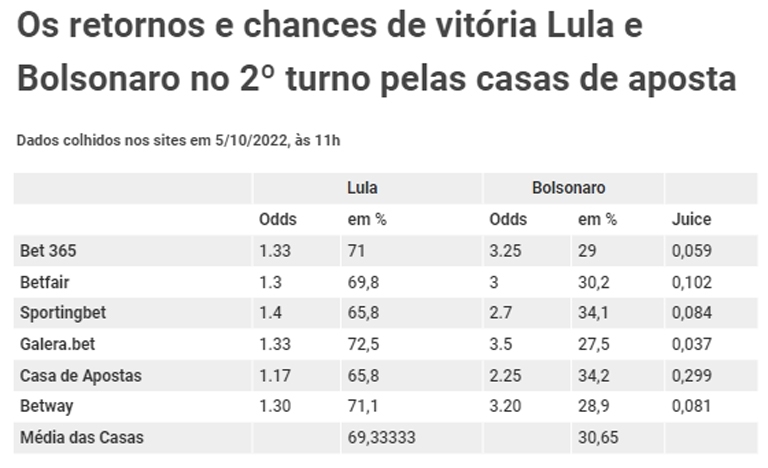

In these elections, several online bookmakers registered abroad allow people to bet amounts of money believing in the victory of a certain candidate in the Brazilian presidential elections and, if they are right, have financial returns on the amount bet. Given that what is at stake is the money of these companies, their calculation of the return on bets is complex and takes into account several factors that minimize their losses.
A survey carried out by Veja with six bookmakers with the help of Professor Fábio Machado, head of the Statistics department at the Institute of Mathematics and Statistics at USP, with data available on the websites this Wednesday (5, at 11 am), shows a percentage of approximate odds for each candidate, according to bettors' estimates. It shows that, on average, they see Luiz Inácio Lula da Silva with a 69.3% chance of winning in the second round against 30.6% for Jair Bolsonaro.

The houses use a calculation for betting that they call “odds”, which in practice is nothing more than the multiple that will affect the amount bet in the event of a hit. At Bet 365, for example, for every R$1 bet on the victory of the candidate Lula, the gambler earns R$1.33 if he wins the elections and R$3.25 in the case of a bet and Bolsonaro wins. The lower the amount paid for the bet, it means that the house expects that event to have a greater chance of happening.
“The mathematics of bookmakers also involves interpretations, it is something that is halfway between mathematics and guesswork, but they involve their money and that is why they make a great effort to have values close to reality. The gamblers' logic is different from what the citizens' passion indicates,” says Machado.
Calculation
The betting houses do not detail how their “odds” are calculated, therefore for the VEJA survey, an approximate projection was made based on the numbers available on each site.
“Statistics works with probabilities in a value from 0 to 1. The candidate's chance of winning is the inverse of the 'odd' and that's why I made the number 'one' divided by the 'odd' value. In the first example, the sum between the two candidates was 1.059. In many cases, this surplus of 0.059 is called 'juice', that is, how much the house earns to place the bet,” says Machado. “To arrive at the percentage, I took the house gain and made a rule of three to see the result of each candidate.”
Source: Veja